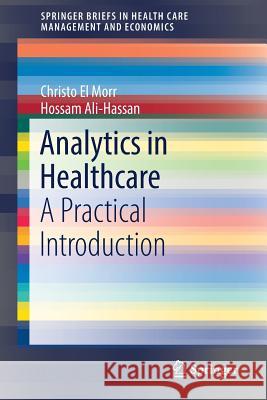Analytics in Healthcare: A Practical Introduction » książka
topmenu
Analytics in Healthcare: A Practical Introduction
ISBN-13: 9783030045050 / Angielski / Miękka / 2019 / 105 str.
Kategorie:
Kategorie BISAC:
Wydawca:
Springer
Seria wydawnicza:
Język:
Angielski
ISBN-13:
9783030045050
Rok wydania:
2019
Wydanie:
2019
Ilość stron:
105
Waga:
0.18 kg
Wymiary:
23.39 x 15.6 x 0.64
Oprawa:
Miękka
Wolumenów:
01
Dodatkowe informacje:
Wydanie ilustrowane











